介词引导的定语从句 -答案
“介词+关系代词”引导的定语从句_
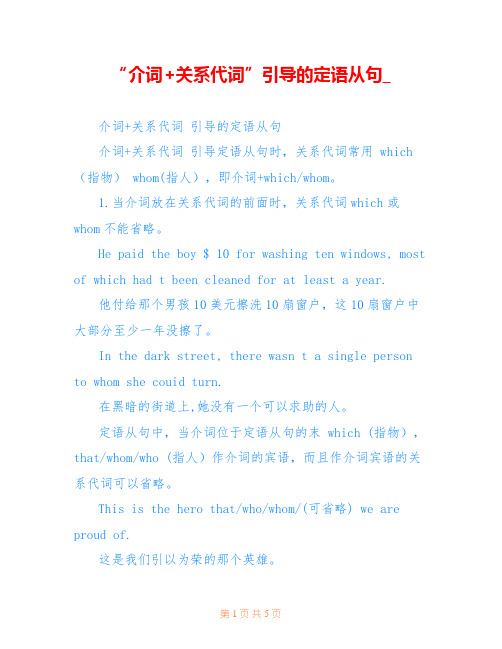
“介词+关系代词”引导的定语从句_介词+关系代词引导的定语从句介词+关系代词引导定语从句时,关系代词常用 which (指物) whom(指人),即介词+which/whom。
1.当介词放在关系代词的前面时,关系代词which或whom不能省略。
He paid the boy $ 10 for washing ten windows, most of which had t been cleaned for at least a year.他付给那个男孩10美元擦洗10扇窗户,这10扇窗户中大部分至少一年没擦了。
In the dark street, there wasn t a single person to whom she couid turn.在黑暗的街道上,她没有一个可以求助的人。
定语从句中,当介词位于定语从句的末 which (指物),that/whom/who (指人)作介词的宾语,而且作介词宾语的关系代词可以省略。
This is the hero that/who/whom/(可省略) we are proud of.这是我们引以为荣的那个英雄。
This is the pen that/which/(可省略) I I wrote the letter with.这是我写信时用的那支钢笔。
【温馨提示】①有些动词+介词的固定词组不可把介词置于关系代词前。
这就是我正在找的磁带。
[误]This is the right tape for which I m looking, [正]This is the right tape that I m looking for.②常见的不可拆开的动词词组有:care for 喜欢,关心deal with 处理,对付get through 通过;到达;接通电话hear from/of 收到某人的来信/听说look for/after寻找/照顾send for派人去请see to照管,料理3.复合介词短语+关系代词which 引导的定语从句,这种结构引导的定语从句常与先行词用逗号分开,定语从句常用倒装语序。
考点18"介词+关系代词"引导的定语从句
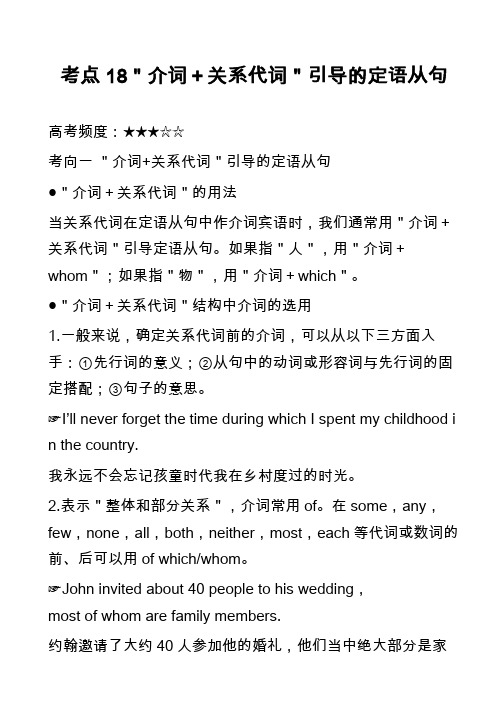
考点18"介词+关系代词"引导的定语从句高考频度:★★★☆☆考向一"介词+关系代词"引导的定语从句●"介词+关系代词"的用法当关系代词在定语从句中作介词宾语时,我们通常用"介词+关系代词"引导定语从句。
如果指"人",用"介词+whom";如果指"物",用"介词+which"。
●"介词+关系代词"结构中介词的选用1.一般来说,确定关系代词前的介词,可以从以下三方面入手:①先行词的意义;②从句中的动词或形容词与先行词的固定搭配;③句子的意思。
☞I’ll never forget the time during which I spent my childhood i n the country.我永远不会忘记孩童时代我在乡村度过的时光。
2.表示"整体和部分关系",介词常用of。
在some,any,few,none,all,both,neither,most,each等代词或数词的前、后可以用of which/whom。
☞John invited about 40 people to his wedding,most of whom are family members.约翰邀请了大约40人参加他的婚礼,他们当中绝大部分是家庭成员。
3.有时"介词+where"可以引导定语从句,此时要和"介词+which"引导的定语从句从意思上加以区别。
☞His head soon appeared out of the window,from where he saw nothing but trees.他的头很快从窗口探了出来,从那里除了树木他什么也看不到。
(from where相当于from out of the window,而不是from the window)●在定语从句中,含介词的短语动词不可拆开使用(短语拆开后含义发生变化),如look after, look for等。
●"of which / whom"有时可以用"whose+名词"结构来改写。
介词+关系代词”引导的定语从句
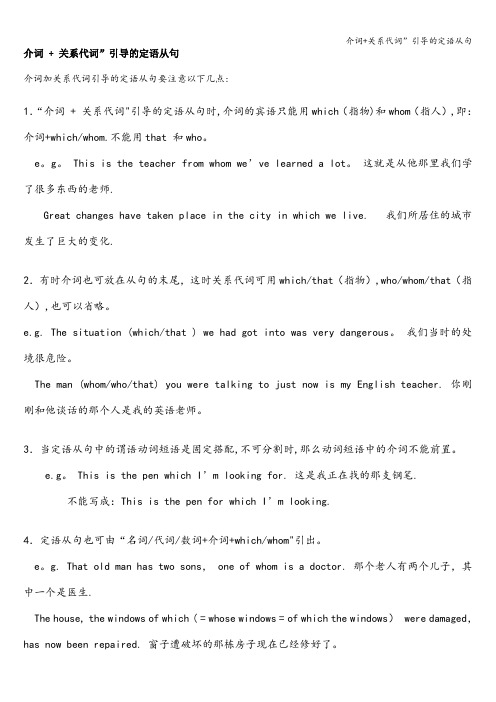
介词+ 关系代词”引导的定语从句介词加关系代词引导的定语从句要注意以下几点:1.“介词 + 关系代词"引导的定语从句时,介词的宾语只能用which(指物)和whom(指人),即:介词+which/whom.不能用that 和who。
e。
g。
This is the teacher from whom we’ve learned a lot。
这就是从他那里我们学了很多东西的老师.Great changes have taken place in the city in which we live. 我们所居住的城市发生了巨大的变化.2.有时介词也可放在从句的末尾,这时关系代词可用which/that(指物),who/whom/that(指人),也可以省略。
e.g. The situation (which/that ) we had got into was very dangerous。
我们当时的处境很危险。
The man (whom/who/that) you were talking to just now is my English teacher. 你刚刚和他谈话的那个人是我的英语老师。
3.当定语从句中的谓语动词短语是固定搭配,不可分割时,那么动词短语中的介词不能前置。
e.g。
This is the pen which I’m looking for. 这是我正在找的那支钢笔.不能写成:This is the pen for which I’m looking.4.定语从句也可由“名词/代词/数词+介词+which/whom"引出。
e。
g. That old man has two sons, one of whom is a doctor. 那个老人有两个儿子,其中一个是医生.The house, the windows of which ( = whose windows = of which the windows) were damaged,has now been repaired. 窗子遭破坏的那栋房子现在已经修好了。
定语从句介词加关系代词专练

第10页/共11页
谢谢您的观看!
第11页/共11页
3. I’ll never forget the day _______ which she said
good-bye to me.
for
4. Who can give me the reason _______ which he
hasn’t turned up yet?
第9页/共11页
Doing is better than saying. 与其挂在嘴上,不如落实在行动上。
第5页/共11页
• 3. Luckily, we’d brought a road map without _____ we would have lost our way.
• A. it B. that C. this D. which • 解析: 答案D。without + which引导定语从句。
10. This is the question __a__b_o__u_t___ which we’ve had
so much discussion.。
11. 1949 was the year ___i_n___ which the P.R.C.
was founded.
第3页/共11页
• 【高考链接】 • 1.George Or well ____ was Eric Ar thur, wrote many political
8. I have bought two ball pens, _____ writes well.
A. none of which B. neither of which
C. none of them
“介词 + which whom”引导的定语从句
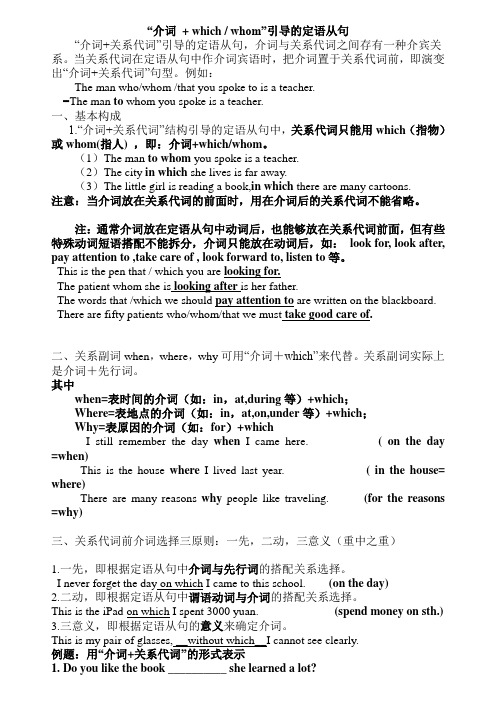
“介词+ which / whom”引导的定语从句“介词+关系代词”引导的定语从句,介词与关系代词之间存有一种介宾关系。
当关系代词在定语从句中作介词宾语时,把介词置于关系代词前,即演变出“介词+关系代词”句型。
例如:The man who/whom /that you spoke to is a teacher.=The man to whom you spoke is a teacher.一、基本构成1.“介词+关系代词”结构引导的定语从句中,关系代词只能用which(指物)或whom(指人) ,即:介词+which/whom。
(1)The man to whom you spoke is a teacher.(2)The city in which she lives is far away.(3)The little girl is reading a book,in which there are many cartoons.注意:当介词放在关系代词的前面时,用在介词后的关系代词不能省略。
注:通常介词放在定语从句中动词后,也能够放在关系代词前面,但有些特殊动词短语搭配不能拆分,介词只能放在动词后,如:look for, look after, pay attention to ,take care of , look forward to, listen to等。
This is the pen that / which you are looking for.The patient whom she is looking after is her father.The words that /which we should pay attention to are written on the blackboard. There are fifty patients who/whom/that we must take good care of.二、关系副词when,where,why可用“介词+which”来代替。
高考链接之“介词关系代词”引导的定语从句

A. which; whereB. at which; whichC. at which; whereD. which; in which
【解析】答案C。第一空为定语从句,先行词是place,表示桥在什么地方建介词用at;第二空为表语从句,表示地点,所以用连接词where。
5.The English play ___________my students acted at the New Year’s party was a great success.
6.It is reported that two schools, ________are being built in my hometown, will open next year.
A. they bothB. which bothC. both of themD. both of which
“介词+关系代词”引导的定语从句
高考链接
1.(09陕西11)Gun control is a subjectAmericans have argued for a long time .
A.of which B.with which C.about which D.into which
2.(09全国I28)She brought with her three friends, none ofI had ever met before.
【解析】答案A。of表示部分与整体的关系“其中的”,“其中80%的鞋销往国外”
8.There are two buildings ,__________stands nearly a hundred feet high .
介词which引导的定语从句
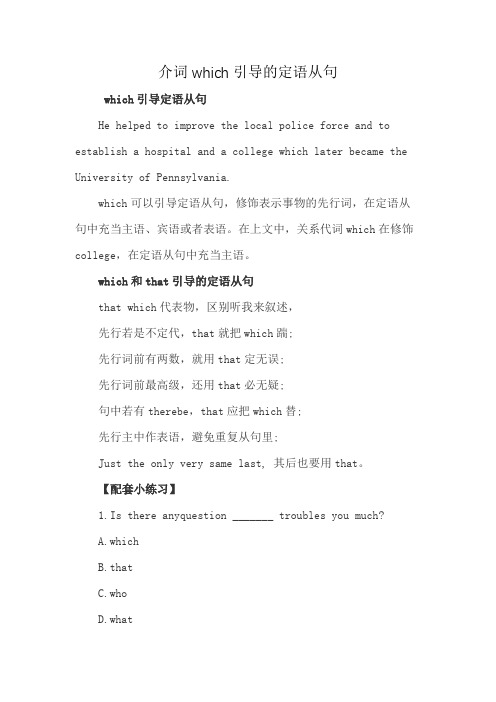
介词which引导的定语从句which引导定语从句He helped to improve the local police force and to establish a hospital and a college which later became the University of Pennsylvania.which可以引导定语从句,修饰表示事物的先行词,在定语从句中充当主语、宾语或者表语。
在上文中,关系代词which在修饰college,在定语从句中充当主语。
which和that引导的定语从句that which代表物,区别听我来叙述,先行若是不定代,that就把which踹;先行词前有两数,就用that定无误;先行词前最高级,还用that必无疑;句中若有therebe,that应把which替;先行主中作表语,避免重复从句里;Just the only very same last, 其后也要用that。
【配套小练习】1.Is there anyquestion _______ troubles you much?A.whichB.thatC.whoD.what2.The last place_____we visited was the Great Wall.A.whichB.thatC.whereD.it3.He talked about themen and books_____ interested him greatly.A.whichB.thatC.itD.whom4.He wrote a letterto tell me everything______ he saw on the way to the Paris.A.whatB.thatC.whichD.where【答案】 1-4 BBBB。
定语从句专项习题(介词关系代词)
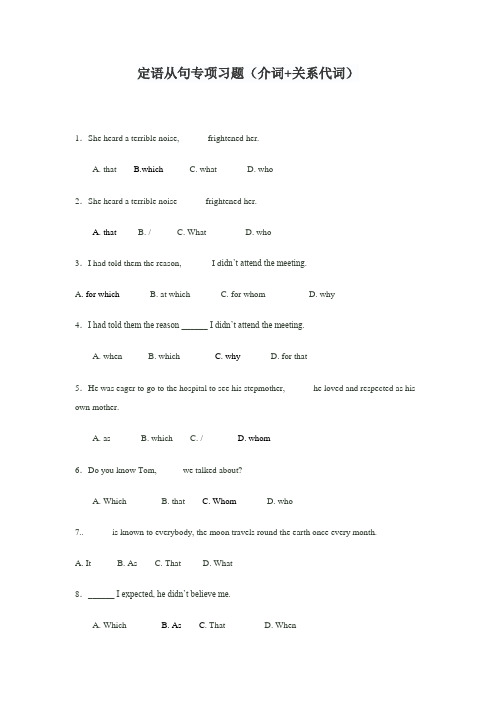
定语从句专项习题(介词+关系代词)1.She heard a terrible noise,______ frightened her.A. thatB.whichC. whatD. who2.She heard a terrible noise______ frightened her.A. thatB. /C. WhatD. who3.I had told them the reason, ______ I d idn’t attend the meeting.A. for whichB. at whichC. for whomD. why4.I had told them the reason ______ I didn’t attend the meeting.A. whenB. whichC. whyD. for that5.He was eager to go to the hospital to see his stepmother,______ he loved and respected as his own mother.A. asB. whichC. /D. whom6.Do you know Tom, _____ we talked about?A. WhichB. thatC. WhomD. who7..______ is known to everybody, the moon travels round the earth once every month.A. ItB. AsC. ThatD. What8.______ I expected, he didn’t believe me.A. WhichB. AsC. ThatD. When9. I have bought two ballpens, _______ writes well.A. none of themB. neither of themC. neither of whichD. none of which10. He bought the car for more than $20,000,______ his father was angry.A. about thatB. with asC. whenD. with which11. He was very rude to the customs officer, ______ of course made things even worse.A. whichB. whomC. whatD. who12. The old lady,______ had been killed in the war, was given help by the local government.A. all her childrenB. all of her childrenC. all of whose childrenD. whose all children定语从句专项练习题1.The place _______interested me most was the Children's Palace.A. whichB. whereC. whatD. in which2.Do you know the man _______?A. whom I spokeB. to who spokeC. I spoke toD. that I spoke3.This is the hotel _______last month.A. which they stayedB. at that they stayedC. where they stayed atD. where they stayed4.Do you know the year ______the Chinese Communist Party was founded?A. whichB. thatC. whenD. on which5.That is the day ______I'll never forget.A. whichB. on whichC. in whichD. when6.The factory ______we'll visit next week is not far from here.A. whereB. to whichC. whichD. in which7.Great changes have taken place since then in the factory _______we are working.A. whereB. thatC. whichD. there8.This is one of the best films _______.A. that have been shown this yearB. that have shownC. that has been shown this yearD. that you talked9.Can you lend me the book ______the other day?A. about which you talkedB. which you talkedC. about that you talkedD. that you talked10.The pen ______he is writing is mine.A. with whichB. in whichC. on whichD. by which11.They arrived at a farmhouse, in front of ______sat a small boy.A. whomB. whoC. whichD. that12.The engineer ______my father works is about 50 years old.A. to whomB. on whomC. with whichD. with whom13.It there anyone in your class ______family is in the country?A. whoB. who'sC. whichD. whose14.I'm interested in ______you have said.A. all thatB. all whatC. thatD. which15.I want to use the same dictionary ______was used yesterday.A. whichB. whoC. whatD. as16.He isn't such a man ______he used to be.A. whoB. whomC. thatD. as17.He is good at English, ______we all know.A. thatB. asC. whomD. what18.Li Ming, ______to the concert, enjoyed it very much.A. I went withB. with whom I wentC. with who I wentD.I went with him19.I don't like ______ as you read.A. the novelsB. the such novelsC. such novelsD. same novels20.He talked a lot about things and persons ________they remembered in the school.A. whichB. thatC. whomD. what21.The letter is from my sister, ______is working in Beijing.A. whichB. thatC. whomD. who22.In our factory there are 2,000 workers, two thirds of ____are women.A. themB. whichC. whomD. who23.You're the only person ______I've ever met ______could do it.A. who;/B./; whomC. whom;/D./; who24.I lost a book, ______I can't remember now.A. whose titleB. its titleC. the title of itD. the title of thatst summer we visited the West Lake, ______Hangzhou is famous in the world.A. for whichB. for thatC. in whichD. what参考答案及解析1. A. which用作关系代词,在定语从句中作主语。
- 1、下载文档前请自行甄别文档内容的完整性,平台不提供额外的编辑、内容补充、找答案等附加服务。
- 2、"仅部分预览"的文档,不可在线预览部分如存在完整性等问题,可反馈申请退款(可完整预览的文档不适用该条件!)。
- 3、如文档侵犯您的权益,请联系客服反馈,我们会尽快为您处理(人工客服工作时间:9:00-18:30)。
介词+关系代词引导的定语从句“介词+关系代词”引导的定语从句是定语从句的一种复杂形式,这类定语从句的关系代词主要有which ,whom , whose , 它们既可以引导限定性定语从句,也可以引导非限定性定语从句。
关系代词前该选用什么样的介词,要根据不同的语境、习语、惯用法等来决定。
一.介词选择的主要标准1.介词与定语从句的先行词是一种习惯性搭配Human facial expressions differ from those animals in the degree to which they can be controlled on purpose.人类的面部表情和动物的面部表情就可控制的程度来说是不一样的。
( to a degree ) The English play in which my students acted at the New Year’s party was a great success.那场在新年晚会上我学生参加表演的英语剧很成功。
( in the play )The schools themselves admit that not all children will be successful in the jobs for which they are being trained.学校本身承认,并不是所有的孩子都能在他们所接受的培训的职业成功。
( be trained for the job )2.介词与定语从句中的动词是一种习惯性搭配Who is the man with whom our teacher is shaking hands? 我们的老师与之握手的那个男士是谁?( shake hands with sb. )Last month , part of Southeast Asia was struck by floods , from whose effects the people are still suffering. 上个月,东南亚的部分地区发生洪水,人们还在遭受着洪水所带来的影响。
(suffer from sth. )3.介词与定语从句中的形容词构成一种习惯性的搭配Ours is a beautiful country , of which we are greatly proud . 我们的国家是一个美丽的国家,我们为之感到很自豪。
( be proud of )The woman to whom Spielberg is married is an actress. 同斯皮尔伯格结婚的女人是一位演员。
( be married to )The woman to whom he was engaged was a doctor. 他与之订婚的那个女士是位医生。
(be engaged to )4.有时关系代词前用什么介词,要根据句子的意思来决定,此时不但要注意其前的搭配,也要注意其后的搭配I was a woman running toward me in the dark. Before I could recognize who she was, she had run back in the dark.Before I could recognize who she was , she had ran back in the direction from which she had come.看见一位妇女在黑暗中像我走来,我还没来得及认清她是谁,她已经从她来的方向跑回去了。
(如果仅注意先行词,很容易受习惯心里的影响而使用in this direction 的搭配,但考虑到语境后的come ,则应该使用from。
)He was educated at the local high school, after which he went on to Beijing University. 他在当地一所高中上学,之后他上了北京大学。
(after which 的意思就是“在当地一所高中接受完教育之后”)。
In the office I never seem to have time until after 5:30 pm. by which time many have got home.在办公室我好像总是没时间,只有等到下午五点半,而那个时候大家都已经回家了。
(此句不能受at 5:30 pm 的通常表达的影响而选用介词at, 而应该依据整个句子的语意来确定介词。
)5.表示“所有格”或“整体与部分关系”时,用介词ofThe journey around the world took the old sailor nine months, of which the sailing time was 226 days.这次环球旅行老水手用了9个月,其中航行的时间是226天。
The factory produces half a million pairs of shoes every year, 80% of which are sold abroad. 这个工厂每年生产50万双鞋,其中的(指50万双鞋)80%销往海外。
I was told that there were about 50 foreign students studying Chinese in the school, most of whomwere from Germany.我被告知这个学校有大约50个外国学生在学习中文,其中大多数来自德国。
I have many friends, of whom some are businessmen. 我有很多朋友,其中有些是生意人。
二.介词不能提前的情况当关系代词在定语从句中作介词的宾语时,介词可以提前放在which(指事物不能用that)或者whom(指人不能用who)之前,也可放于原来的位置,但在含有介词的动词固定短语中,由于动词和介词的关系比较紧密,一般不能将介词与动词拆开而将介词提到关系代词之前。
这类短语动词有listen to/look at/depend on/take care of/look into/break into/get rid of/look forward to等。
This is the room which/that Lu Xun used to live in.(=This is the room in which Lu Xun used to live.)这是鲁迅曾经住过的房间。
The man一、基本构成1.“介词+关系代词”结构引导的定语从句中,关系代词只能用which(指物)或whom(指人) ,即:介词+which/whom。
(1)The man to whom you spoke is a teacher.(2)The city in which she lives is far away.(3)The little girl is reading a book,in which there are many cartoons.注意:当介词放在关系代词的前面时,用在介词后的关系代词不能省略。
2.关系副词when,where,why可用“介词+which”来代替。
关系副词实际上是介词+先行词。
其中when=表时间的介词(如:in,at,on,during等)+which;Where=表地点的介词(如:in,at,on,under等)+which;Why=表原因的介词(如:for)+which(1)当先行词表示时间,定语从句中缺少时间状语时,通常用关系副词when引导,此时也可选用表示时间的介词+which来代替关系副词when。
I still remember the day when I came here. ( on the day =when)(2)当先行词表示地点,定语从句中缺少地点状语时,通常用关系副词where引导,此时也可选用表示地点的介词+which来代替关系副词where。
This is the house where I lived last year. ( in the house= where)(3)当先行词为reason,定语从句中缺少表示原因状语时,通常用关系副词why引导,此时也可以用for which来代替关系副词why。
There are many reasons why people like traveling. (for the reasons =why注意:1. 含有介词的短语动词一般不拆开, 介词仍放在短语动词的后面。
如: look for, look after, take care of,pay attention to, look forward to 等。
This is the watch (which / that) I am looking for.2.“介词+关系代词”前还可有some, any, none, all, both, neither, many, most, each, few等代词或者数词,表示先行词的一部分或全部。
He loves his parents deeply, both of whom are very kind to him.In the basket there are quite many apples, some of which have gone bad.二.介词的选择关系代词前介词选择三原则:一先,二动,三意义(重中之重)1.一先,即根据定语从句中介词与先行词的搭配关系选择。
I never forget the day on which I came to this school. (on the day)2.二动,即根据定语从句中谓语动词与介词的搭配关系选择。
This is the iPad on which I spent 3000 yuan. (spend money on sth.)3.三意义,即根据定语从句的意义来确定介词。
This is my pair of glasses, __without which__I cannot see clearly.根据从句中动词与先行词的逻辑关系。
Eg:Is that the newspaper for which you often write articles?The school (which/that ) he once studied in is very famous.=The school in which he once studied is very famous.他曾经就读过的学校很出名。
